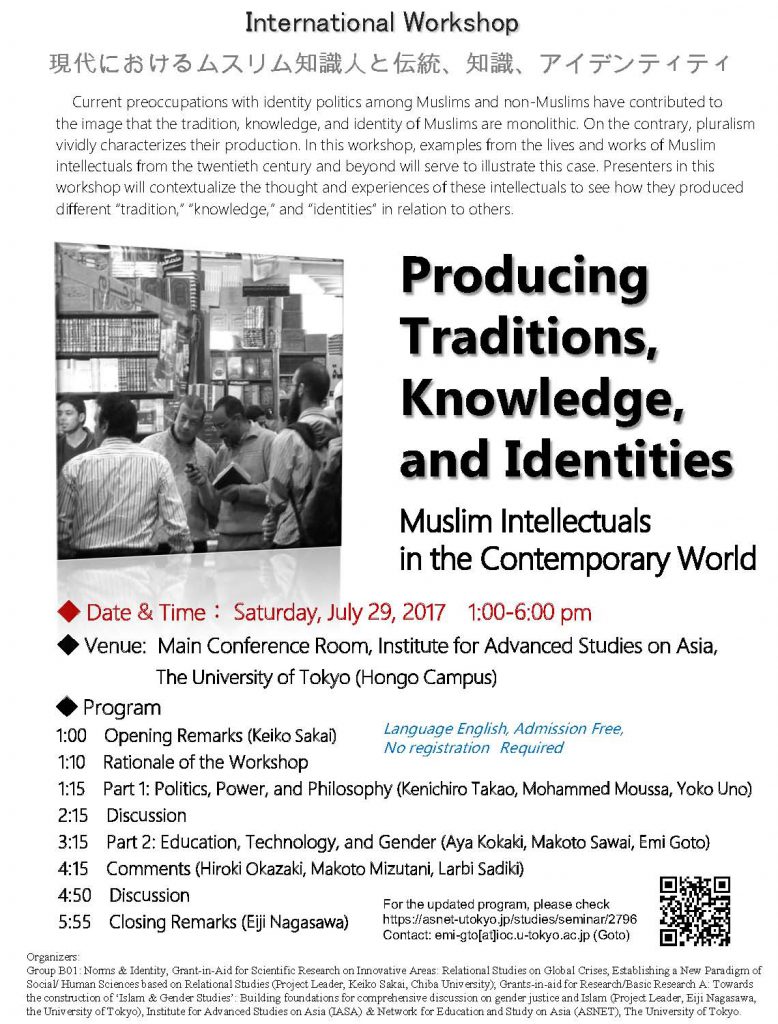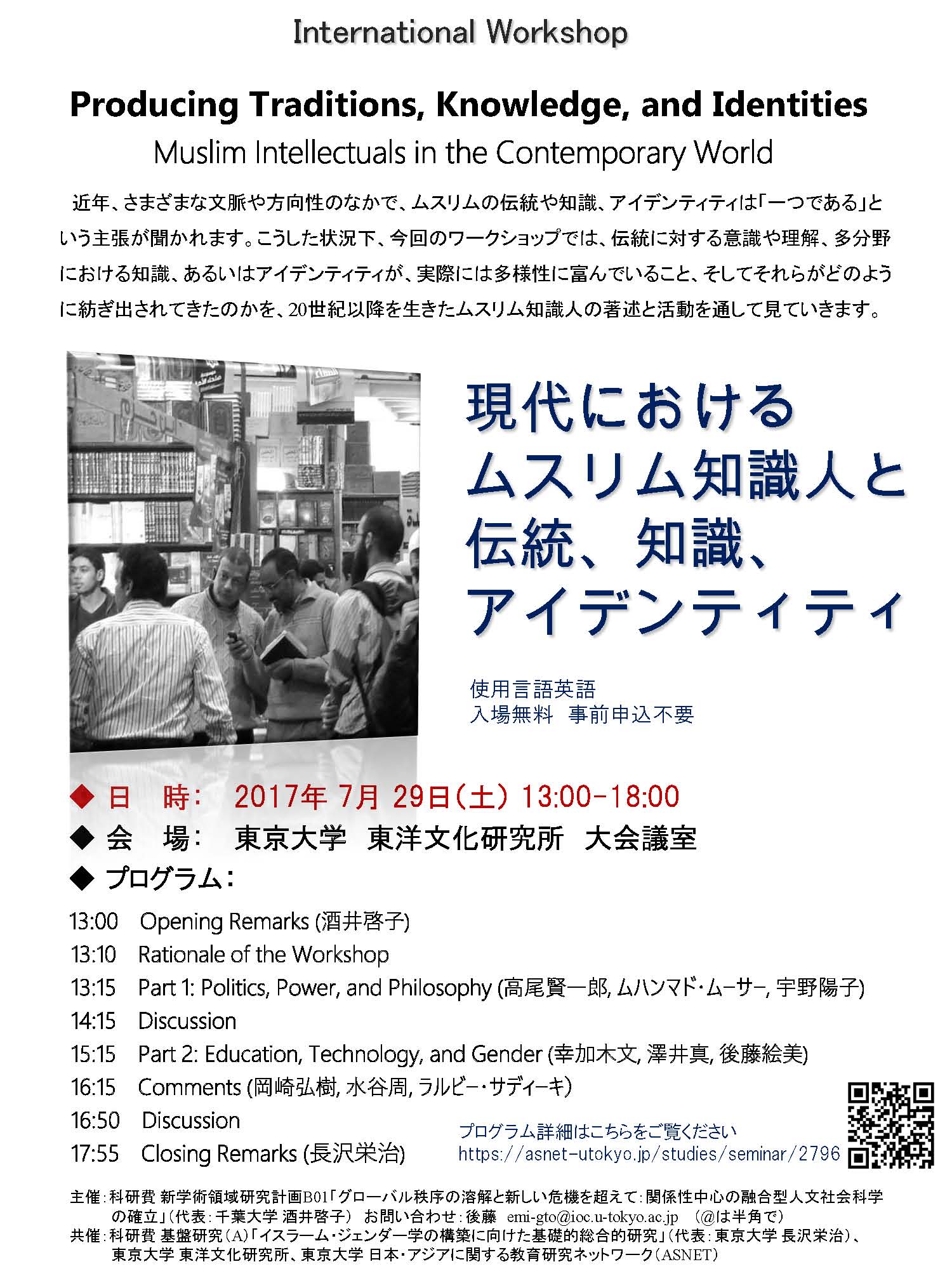Relational Studies on Global Crises Project will hold an international workshop titled “Producing Traditions, Knowledge and Identities: Muslim Intellectuals in the Contemporary World”.
One of the aims of our project is to understand modern global societies through the simultaneous analysis of the following three areas: the subject (people, nation, region, and others), the relationships within the subject, and the relationships among the various levels and spheres in connection with each other.
Current preoccupations with identity politics among Muslims and non-Muslims have contributed to the image that the tradition, knowledge, and identity of Muslims are monolithic. On the contrary, pluralism vividly characterizes their production. In this workshop, examples from the lives and works of Muslim intellectuals from the twentieth century and beyond will serve to illustrate this case. Presenters in this workshop will contextualize the thought and experiences of these intellectuals to see how they produced different “tradition,” “knowledge,” and “identities” in relation to others.
| 日時/Date | 2017年7月29日(土)13:00-18:00
Saturday, July 29, 2017 1:00-6:00 pm |
|---|---|
| 会場/Venue | 東京大学東洋文化研究所 大会議室
Main Conference Room, Institute for Advanced Studies on Asia, The University of Tokyo |
| プログラム /Program (tentative) |
1:00 Opening Remarks (Keiko Sakai, Project Leader, Relational Studies on Global Crises)
1:10 Rationale of the Workshop
1:15 Part 1 Politics, Power, and Philosophy
Paper 1 “An Attempt to Portray Sharif in Wahhabi Society: Muhammad Alawi al-Maliki” (Kenichiro Takao)
Paper 2 “Shaykh Jawdat Said’s Radical Islamic Pacifism: Critiquing Violence and Power” (Mohammed Moussa)
Paper 3 “An Exiled Nationalist Rıza Nur: Searching for Modernity, Secularism and ‘Turkishness’ in Modern Turkey” (Yoko Uno)
2:15 Discussion
2:35 Coffee break
3:15 Part 2 Education, Technology, and Gender
Paper 4 “Education as a Tool for What? A Comparison of a Secular Intellectual with a Religious Intellectual in Turkey” (Aya Kokaki)
Paper 5 “Islamic and Arab Spirit with Western Technology: How were Sufis treated in Modern Islam?” (Makoto Sawai)
Paper 6 “How Far Rereading of the Sacred Text May Go? Gender Questions during the 20th Century” (Emi Goto)
4:15 Comments
Hiroki Okazaki Makoto Mizutani Larbi Sadiki “Towards an Arab Democratic knowledge: To be or not to be…” 4:50 Discussion
5:55 Closing Remarks (Eiji Nagasawa, Project Leader, Towards the construction of ‘Islam & Gender Studies’)
|
| 主催/Organizer | 主催:科研費 新学術領域研究計画B01「規範とアイデンティティ:社会的紐帯とナショナリズムの間」グローバル秩序の溶解と新しい危機を超えて:関係性中心の融合型人文社会科学の確立(代表:千葉大学 酒井啓子)Group B01: Norms & Identity, Grant-in-Aid for Scientific Research on Innovative Areas: Relational Studies on Global Crises, Establishing a New Paradigm of Social/ Human Sciences based on Relational Studies (Project Leader, Keiko Sakai, Chiba University)
Contact: emi-gto[at]ioc.u-tokyo.ac.jp (Emi Goto) |
| 共催/Co-organizer | 科研費 基盤研究(A)「イスラーム・ジェンダー学の構築に向けた基礎的総合的研究」(代表:東京大学 長沢栄治)、東京大学 東洋文化研究所、東京大学 日本・アジアに関する教育研究ネットワーク(ASNET)
Grants-in-aid for Research/Basic Research A: Towards the construction of ‘Islam & Gender Studies’: Building foundations for comprehensive discussion on gender justice and Islam (Project Leader, Eiji Nagasawa, the University of Tokyo), Institute for Advanced Studies on Asia (IASA) & Network for Education and Study on Asia (ASNET), The University of Tokyo. |



